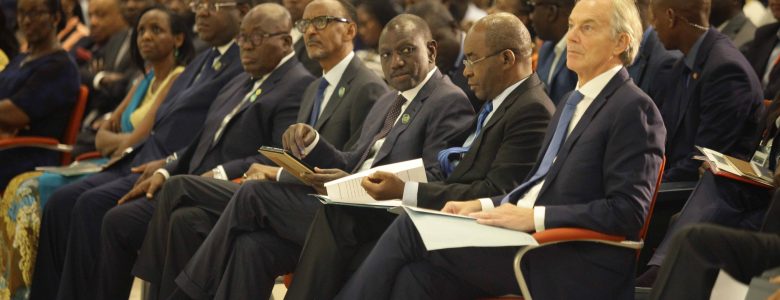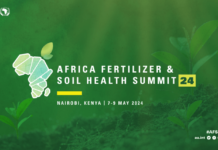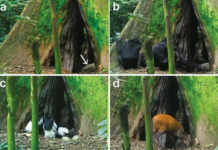African Green Revolution Forum also cements new partnerships with China, Israel and Brazil, and embraces a new level of evidence-based leadership and accountability from African governments
Kigali, Rwanda : The African Green Revolution Forum (AGRF), the continent’s most influential gathering around Africa’s largest economic sector, concluded Saturday with ambitious commitments to deliver billions of dollars in new investments to African farms and agribusinesses, triple agriculture trade between African countries, and forge new partnerships with a cast of development partners from China, India, Brazil, and Israel.
The meeting also featured the launch of an aggressive new consortium to defeat the invasion of the Fall armyworm now threatening up to US $6 billion of damage to African maize, sorghum and other critical food crops. In addition, a new multi-billion dollar irrigation initiative could bring a new level of stability to Africa’s rain-fed farming regions.
“The majority of Africans still earn their livelihoods… from the land so agriculture deserves the concentrated attention of Africa’s policy makers, scientists and entrepreneurs,” said H.E. Paul Kagame, President of Rwanda, the official host country of the Forum. “Fortunately we know what works,” he said, “and the experience and goodwill in evidence at this forum shows that we have everything we need to succeed.”
The forum attracted some 2800 delegates from around the world, filling the ultra-modern convention centrex in downtown Kigali, which was ringed at night with neon green, to full capacity for three days of intensive discussions and deal-making. It’s theme of Lead, Measure, Grow highlighted the critical importance of political leadership and rigorous, honest assessments of progress in the agriculture sector for achieving growth that can spread across the entire economy.
“The aspirations for African agriculture are extremely high across the continent, and progress, as usual, is not enough to achieve them,” said Dr. Agnes Kalibata, President of the Alliance for a Green Revolution in Africa (AGRA), which serves as the secretariat for the annual event. “Partners from across the region and around the world are becoming equally ambitious with their commitments and then demonstrating their ability to follow through.”
Farmer and Agribusiness Investments: Now at US $60 Billion and Counting.
A crucial goal for AGRF 2018 was to secure greater investments for African farmers and agriculture businesses. And the community rose to the challenge. In Rwanda alone, business leaders laid out plans to increase agriculture export revenue by US $150 million annually and create 300,000 additional jobs over the next five to six years.
The Pitch Agrihack competition, organized by the Technical Centre for Agricultural and Rural Cooperation (CTA), matched young entrepreneurs with venture capitalists to pitch ideas like remote farm management system in Kenya and new approaches to providing farmer legal services in Uganda. The AGRF Deal Room, a new feature of the Forum, hosted 16 companies—drawn from a pool of over 400 applications—and achieved investment agreements that averaged around US $2 million.
Meanwhile, a coalition that included the International Fund for Agricultural Development (IFAD), the European Union, the Government of Luxembourg, and AGRA laid plans for an ambitious alliance that has the potential to consolidate tens of millions of dollars in new investments for commercial agriculture ventures in Africa, with a strong focus on attracting youth.
Also, IFAD’s President, Gilbert Houngbo, said IFAD anticipates delivering a total of $3.5 billion in new investments over the next few years, half of which will flow to Africa.
In addition, officials from the African Enterprise Challenge Fund (AECF) detailed the launch of the US $50 million Investing in Women fund that already has secured a $6.42 million dollar commitment from the United Kingdom’s Department for International Development (DFID).
Strive Masiyiwa, Founder and Chairman, ECONET Group and Chair of the AGRF Partners Group, said that starting with the 2016 AGRF in Nairobi, commitments to transforming Africa’s poorly performing farmers into poverty fighting powerhouses now tops US $60 billion.
“There is something going on out there and our young people are beginning to turn their heads and see the possibilities in agriculture,” he said. “They are beginning to realize that we can’t have a paradox where the average age (of the population) is 19 years but for our farmers it is approaching 60.”
New Energy Around Agriculture Trade
Trade emerged as an area that could supercharge the sector. The recent establishment of Africa’s Continental Free Trade Area (CFTA), the largest free trade pact since the creation of the World Trade Organization (WTO), animated discussions around the potential for reforms—documented at the meeting with the launch of the new African Agricultural Trade Status Monitor—that could triple trade in agriculture commodities between African countries.
“Trade is a driver of growth and we know that when we trade in agriculture, it drives growth from the bottom up,” said Vera Songwe, Executive Secretary of the United Nations Economic Commission for Africa.
H.E. William Ruto, Deputy President of Kenya, said consolidating the CFTA will give African countries the “platform and the muscle” they need to negotiate as equals with trade blocs like the European Union. But he also wants to see African countries focusing more attention on the neglected opportunities with their neighbours next door.
“Why struggle to access the markets in Europe when we can’t access the market next door,” Ruto said. “We have made it easier to export to Europe than to export to Ghana or Rwanda.”
Embracing New Friends for African Farmers
AGRF 2018 also highlighted new agriculture partnerships emerging with China, Israel, India and Brazil.
The forum occurred right on the heels of the historic 2018 Forum on China-Africa Cooperation (FOCAC) in Beijing that featured an unprecedented package of agriculture investments and technical assistance programs flowing from China to Africa. Hon. Wu Hongyao of China’s Ministry of Agriculture and Rural Affairs confirmed the new partnerships, noting that they will include major initiatives with ten agriculture universities in Africa and the construction of new agriculture demonstration centres and agriculture-focused industrial parks.
Israel emerged as an increasingly familiar face in African agriculture. At the Forum, a new memorandum of understanding (MOU) was signed between AGRA and Israel’s Volcani International Partnerships to pursue a number of initiatives, including an Israeli-Africa Agriculture Innovation Center to be hosted jointly by Volcani and Israel’s Agriculture Research Organization. There were also representatives from Israel’s “Start-up Nation Central” on hand to lend their expertise to Africa’s growing number of agriculture-related start-ups.
A State Minister from India’s Ministry of Agriculture and Farmers Welfare noted that “India and Africa are starting on a new journey with India bringing its experience in transforming itself from a food-deficit to food-surplus country.” Meanwhile officials from Brazil signaled intentions to develop new partnerships around agriculture development in Africa. And
Keeping Score in the Agriculture Sector, Fertilizing Farms with Political Power
Leaders applauded the launch in January of the first Inaugural Biennial Review, which features an African Agriculture Transformation Scorecard (AATS). Together they provide a detailed, ground-breaking assessment of where countries are progressing in achieving an agriculture transformation, as well as those areas that still need attention. The report revealed that 20 of 47 African Union Member States are on track to achieve commitments made at the 2014 AU Summit in Malabo, Equatorial Guinea. And they commended the willingness of all 47 countries to provide this thorough and transparent accounting of progress and ongoing commitment to evidence-based leadership.
Meanwhile, the forum featured the launch of the 2018 African Agriculture Status Report “Catalyzing State Capacity to Drive Agriculture Transformation,” the most comprehensive assessment to date of the role of state capacity and political will in achieving that “transformation.” The exhaustive analysis found agriculture is delivering strong economic growth and sharply reducing poverty in countries where there is steadfast political support for agriculture—and it’s paired with compelling visions, strategies and institutional capacity.
Finally, other notable achievements at the 2018 AGRF included:
- The launch of the new Fall Armyworm Research for Development (R4D) International Consortiumthat brings together 35 public and private sector institutions to create a coordinated strategy and consolidate millions of dollars in new support to fight an invasive plant eating insect that threatening US $6 billion in damage to maize and other African food staples.
The announcement of the 2018 Africa Food Prize Laureate, which was awarded to the International Institute of Tropical Agriculture (IITA), the first institution to receive the prestigious award.
- The announcement of the new Farmer-led Irrigation for Smallholder Farming Enterprises. The ambitious program will seek to deliver US $9 billion in technologies, public investment, commercial financing, and capacity building, that will enable individual smallholders, as individuals or cooperatives, to afford, own, operate and benefit from irrigation systems.
Finally, AGRF featured sombre but fond remembrances of the late Kofi Annan, the Ghanaian diplomat who served two terms as UN Secretary General and is widely revered for elevating the importance of agriculture in Africa to the top of the development agenda. Masiyiwa said when he last spoke with Annan, he was making plans to travel to Kigali for AGRF.
“We mobilized around his leadership,” Masiyiwa said. “He realized that it would be impossible to carry out a Green Revolution that was not Africa-led, Africa-based and was using African skills.”
For more information, please contact: Waiganjo Njoroge, AGRA Interim Head of Communications at wnjoroge@agra.org or +254 723 857 270









